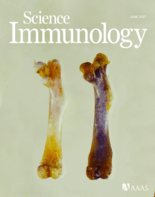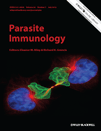
Immunity & Ageing
Scope & Guideline
Unveiling the Secrets of Immune Function in Aging
Introduction
Aims and Scopes
- Immunosenescence and Inflammaging:
Research on how aging affects the immune system, leading to reduced immune function (immunosenescence) and chronic low-level inflammation (inflammaging), which contribute to age-related diseases. - Age-Related Disease Mechanisms:
Exploration of the immune mechanisms involved in age-related diseases such as Alzheimer's, cardiovascular diseases, and cancer, focusing on how aging modifies disease progression and treatment efficacy. - Therapeutic Strategies for Aging:
Development of interventions aimed at improving immune responses in older adults, including vaccine efficacy, immunotherapies, and lifestyle modifications to enhance health span. - Microbiome and Aging:
Investigating the role of gut microbiota in modulating immune responses and their impact on aging and age-related diseases. - Sex Differences in Immunity and Aging:
Studies focusing on how biological sex influences immune aging and response to diseases, highlighting the need for sex-specific approaches in research and treatment.
Trending and Emerging
- Impact of COVID-19 on Aging:
A significant increase in research addressing the effects of COVID-19 on older adults, particularly focusing on immune responses, vaccination efficacy, and long-term health implications. - Personalized Immunotherapy Approaches:
Emerging interest in personalized medicine and immunotherapy for older adults, including the use of biomarkers to tailor treatments based on individual immune profiles and responses. - Role of the Gut Microbiome:
Growing research on the gut microbiome's influence on immune function and aging, emphasizing the need for interventions that modulate microbiota to enhance health outcomes in older populations. - Neuroinflammation and Cognitive Decline:
Increased focus on the relationship between neuroinflammation and cognitive decline in aging, particularly in the context of neurodegenerative diseases like Alzheimer's. - Sarcopenia and Immunity:
Emerging studies linking sarcopenia with immune dysfunction in older adults, exploring how muscle health impacts immune responses and overall aging.
Declining or Waning
- Traditional Vaccine Responses:
Research on conventional vaccine responses in older adults has decreased as newer studies emphasize the role of hybrid immunity and personalized vaccine strategies tailored for the elderly. - Basic Mechanisms of Aging:
The exploration of fundamental biological mechanisms of aging, such as telomere shortening and oxidative stress, appears to be waning in favor of more applied research focused on immunological outcomes and therapeutic applications. - Non-Inflammatory Aging Mechanisms:
There has been a noticeable reduction in studies focused solely on aging without the context of immune response, as the field increasingly prioritizes the intersection of immunity and aging.
Similar Journals

Immunotherapy Advances
Exploring novel strategies for a healthier tomorrow in immunotherapy.Immunotherapy Advances, published by Oxford University Press, stands at the forefront of the rapidly evolving field of immunology and microbe interactions, focusing specifically on novel immunotherapeutic strategies and their clinical applications. Established in 2021, this peer-reviewed journal aims to disseminate high-quality research that contributes to the understanding and advancement of immunotherapeutic techniques, potentially transforming patient care in immunology. With a current Scopus rank of #140 out of 236 in the realm of Immunology, placing it in the 40th percentile, Immunotherapy Advances is positioned to be an integral resource for researchers, healthcare professionals, and students eager to stay updated with groundbreaking findings and methodologies. The journal is dedicated to fostering innovative discussions and collaborations, ensuring open access to vital research that influences treatment paradigms globally.

Science Immunology
Unlocking the Secrets of the Immune SystemScience Immunology, published by the American Association for the Advancement of Science, is a leading journal in the field of immunology, recognized for its significant impact and rigor in advancing our understanding of immune responses and complex diseases. With an impressive impact factor that places it in the Q1 category of both immunology and allergy, as well as miscellaneous medicine, this journal is ranked #7 and #8 in their respective Scopus categories, reflecting its high-quality research output. Since its inception in 2016, Science Immunology has been at the forefront of interdisciplinary immunological research, fostering crucial insights that link immunology with pressing health challenges. The journal is committed to providing open access to its content, ensuring that groundbreaking findings are accessible to a global audience of researchers, professionals, and students. Its anthology not only addresses fundamental immunological mechanisms but also enhances the dialogue on translational applications and therapeutic interventions, solidifying its position as an essential resource within the scientific community.

JOURNAL OF IMMUNOLOGY
Driving Discoveries in Immune HealthWelcome to the JOURNAL OF IMMUNOLOGY, a prestigious publication associated with the American Association of Immunologists and dedicated to advancing the field of immunology. With a rich history dating back to 1945, this journal is renowned for its high-impact research, evident in its notable 2023 Q1 rankings in both Immunology and Allergy, as well as its strong positions in Scopus rankings—Rank #68 in Immunology and Allergy and Rank #79 in Immunology and Microbiology. Although it operates on a subscription basis, its commitment to publishing cutting-edge studies ensures that it remains a vital resource for scientists, healthcare professionals, and students alike. As the journal continues to pave the way for innovative research and breakthroughs in immunological science, it facilitates a platform for dialogue and discovery among researchers and practitioners across the globe.

IMMUNOLOGY AND CELL BIOLOGY
Exploring the Intricacies of Immunology and Cell InteractionsIMUNOLOGY AND CELL BIOLOGY, published by Wiley, serves as a prominent platform for disseminating cutting-edge research in the fields of immunology and cell biology. With an ISSN of 0818-9641 and an E-ISSN of 1440-1711, this journal has established itself since its inception in 1987, demonstrating a commitment to advancing knowledge in its disciplines through high-quality articles. Renowned for its rigorous peer-review process, it holds a Q2 quartile ranking in both immunology and cell biology categories as of 2023, showing its competitive stature in these fields. IMUNOLOGY AND CELL BIOLOGY is indexed among the elite journals worldwide, with impressive Scopus rankings, including a rank of #75/233 in Immunology and Allergy. The journal’s comprehensive scope ensures that it caters to an audience of researchers, professionals, and students who are dedicated to exploring the intricate mechanisms of immune responses and cellular interactions. Although it does not operate under an open access model, its subscription-based content remains invaluable for those seeking to broaden their understanding of immunology and cell biology. By providing a forum for significant scientific dialogue, IMUNOLOGY AND CELL BIOLOGY continues to shape the future of research in these vital areas.

PARASITE IMMUNOLOGY
Shaping the Future of Parasitic Disease Management.PARASITE IMMUNOLOGY, published by Wiley, is a leading journal in the field of immunology and parasitology, with an ISSN of 0141-9838 and E-ISSN of 1365-3024. Since its inception in 1979, it has played a pivotal role in advancing our understanding of host-parasite interactions, immunological responses to parasitic infections, and the mechanisms of immunological resistance. The journal is adeptly positioned within the academic community, currently holding a prestigious Q2 ranking in Parasitology and a Q3 ranking in Immunology for 2023, indicating its significant influence and relevance. Its comprehensive scope attracts a diverse readership, contributing to the discourse surrounding novel therapeutic approaches and emerging challenges in parasitic diseases. With a consistent convergence of research until 2024, PARASITE IMMUNOLOGY is an essential resource for researchers, professionals, and students seeking to deepen their knowledge and foster collaboration in these dynamic fields. Although it is not an open-access journal, the insights shared within its pages are invaluable for shaping future research trajectories.

Mucosal Immunology
Transforming Understanding of Mucosal SystemsMucosal Immunology, published by Elsevier Science Inc, is a leading journal dedicated to advancing the field of immunology with a particular focus on mucosal immunity. Since its inception in 2008, the journal has established itself as a premier source of cutting-edge research, evidenced by its impressive Q1 ranking in both Immunology and Allergy for 2023, and its notable positions within the top ranks of Scopus (Rank #21/233 in Immunology and Allergy and Rank #24/236 in Immunology and Microbiology). The journal serves as a vital resource for researchers, professionals, and students aiming to explore the complexities of mucosal immune responses and their implications in health and disease. While it operates under a subscription model, Mucosal Immunology is committed to disseminating quality research globally and enhancing collaborative efforts within the scientific community. Explore the latest findings and connect with influential scholarship in this rapidly evolving field.

Innate Immunity
Advancing the Frontiers of Immune ResearchInnate Immunity, published by SAGE Publications Ltd, serves as a vital platform for disseminating cutting-edge research in the fields of immunology, microbiology, cell biology, and infectious diseases. With an ISSN of 1753-4259 and an E-ISSN of 1753-4267, this journal has been a prominent contributor to the academic community since its inception in 1996, focusing on the innate immune response and its implications for health and disease. Holding a respectable impact factor and categorized in the Q2 and Q3 quartiles across various relevant domains, Innate Immunity ranks competitively in major databases, including Scopus, where it appears in the top 75th percentile for Infectious Diseases. Researchers and professionals are encouraged to explore its wealth of articles that are pivotal in bridging fundamental immunology with clinical applications, fostering a deeper understanding of immune mechanisms vital for combating human diseases.

HUMAN IMMUNOLOGY
Advancing the Frontiers of Immune ResearchHUMAN IMMUNOLOGY, published by Elsevier Science Inc, serves as a critical platform for disseminating research in the fields of immunology and allergy, as well as various aspects of miscellaneous medicine since its inception in 1980. With an ISSN of 0198-8859 and E-ISSN 1879-1166, this journal is pivotal for researchers and practitioners looking to advance their understanding of human immune responses and related conditions. The journal currently holds a respectable position within its field, as highlighted by its 2023 Scopus ranks—#114/233 in Immunology and Allergy and #132/236 in Immunology and Microbiology. Moreover, it maintains a Q2 quartile ranking in both Immunology and Allergy and miscellaneous Medicine, underscoring its influence and reach within the scientific community. Although it does not currently offer Open Access options, HUMAN IMMUNOLOGY remains dedicated to providing valuable insights and fostering academic discourse within its discipline, characterized by a rigorous peer-review process and a focus on innovative research trajectories.

GERONTOLOGY
Bridging Disciplines in Gerontological StudiesGERONTOLOGY, published by KARGER in Switzerland, is a prominent journal dedicated to the study and understanding of aging, with a keen focus on the interdisciplinary aspects of geriatric medicine and gerontology. Established in 1957, it has provided a platform for cutting-edge research that covers a wide range of topics including, but not limited to, the biological, psychological, and sociological aspects of aging. With an impressive ranking that places it in the Q3 category for Aging and Q2 for Geriatrics and Gerontology as of 2023, the journal continues to attract high-quality submissions from researchers worldwide, evidenced by its Scopus rankings, which position it favorably within relevant fields. While it operates under a subscription model, the journal remains committed to advancing knowledge that informs practice and policy within an aging society. By fostering innovative studies and discussions, GERONTOLOGY serves as an essential resource for researchers, health professionals, and students alike, dedicated to the care and understanding of older adults.

Seminars in Immunopathology
Advancing Insights in Immunological ResearchSeminars in Immunopathology is a premier academic journal published by SPRINGER HEIDELBERG, focusing on the intricate relationships between immune responses and pathologies. With an ISSN of 1863-2297 and an E-ISSN of 1863-2300, this journal delivers cutting-edge research and insights to its readers, contributing significantly to the fields of immunology and allergy, as reflected in its Q1 quartile ranking in both categories for 2023. Positioned in a highly competitive niche, it ranks #18 out of 233 in Immunology and Allergy and #22 out of 236 in Immunology and Microbiology, highlighting its impact within the scientific community. Seminars in Immunopathology publishes comprehensive reviews and research articles, aiming to advance understanding of immune mechanisms in disease and promote interdisciplinary collaboration. Accessible from Germany, this journal is a vital resource for researchers, clinicians, and students seeking to stay at the forefront of immunological advancements and therapeutic innovations.